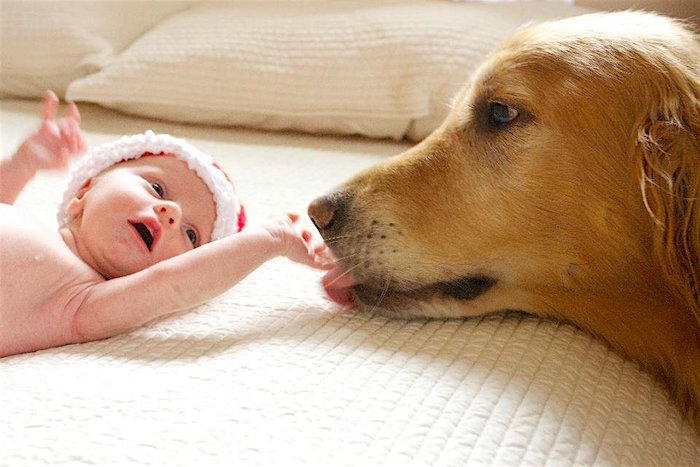 Researchers have known for a long time that young kids who are exposed to pets have less of a risk of allergies. But now a new study shows that babies from families who have pets are less likely to become obese.
Researchers have known for a long time that young kids who are exposed to pets have less of a risk of allergies. But now a new study shows that babies from families who have pets are less likely to become obese.
The study by University of Alberta researchers found that infants exposed to pets had higher levels of two types of microbes linked to reduced risks of allergic disease and obesity. Most of the family pets—70 percent—were dogs.
The timing of exposure to pets was important, as the children had to be exposed early in life to receive the most benefit.
“There’s definitely a critical window of time when gut immunity and microbes co-develop, and when disruptions to the process result in changes to gut immunity,” said Anita Kozyrskyj, a University of Alberta pediatric epidemiologist and one of the world’s leading researchers on gut microbes, microorganisms that live in the digestive tracts of humans and animals.
The results, published in the journal Microbiome, expand upon two decades of evidence that children whose families have a dog are less likely to have asthma. Scientists believe the reduced risk occurs because children in contact with dogs are exposed to dirt and bacteria early in life, which can boost a young child’s immunity.
In the current study, Kozyrskyj and her team of scientists found that exposure to pets while in the womb or up to three months following birth increases the numbers of two bacteria: Ruminococcus, linked to reduced childhood allergies, and Oscillospira, associated with a reduced likelihood of becoming obese.
“The abundance of these two bacteria were increased twofold when there was a pet in the house,” said Kozyrskyj. Pet exposure indirectly impacted the gut microbiome, the microorganisms that live in the intestines, from dog to mother to unborn baby. The researchers observed the effect during pregnancy as well as the first three months of the baby’s life. This healthy microbiome exchange occurred even if the dog was only present up until just before the mother gave birth.
Often, C-section births reduce immunity compared with vaginal delivery. Antibiotics during birth and lack of breastfeeding have a similar effect on the immune system. However, this study found that the immunity-boosting exchange between pets, mothers, and infants took place even during those three situations known to lower immunity.
Another finding of the study: living with pets made it less likely that vaginal GBS (group B Strep) would be transmitted from mother to baby during birth. This type of bacteria causes pneumonia in newborns. Doctors give mothers antibiotics during delivery to prevent the bacteria’s spread.
Based on the results of the study, Kozyrskyj speculates that in the future, mothers and children could be given a “dog in a pill” to ward off allergies and obesity.
“It’s not far-fetched that the pharmaceutical industry will try to create a supplement of these microbiomes, much like was done with probiotics,” she said.
Source: Hein M. Tun, Theodore Konya, Tim K. Takaro, Jeffrey R. Brook, Radha Chari, Catherine J. Field, David S. Guttman, Allan B. Becker, Piush J. Mandhane, Stuart E. Turvey, Padmaja Subbarao, Malcolm R. Sears, James A. Scott, Anita L. Kozyrskyj. Exposure to household furry pets influences the gut microbiota of infant at 3–4 months following various birth scenarios. Microbiome, 2017;5:(1) DOI: 10.1186/s40168-017-0254-x












[…] Pet Exposure Linked to Lower Risk for Allergies and Obesity […]